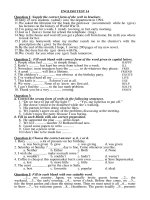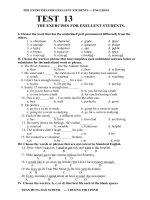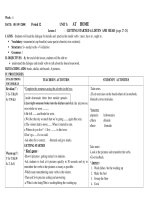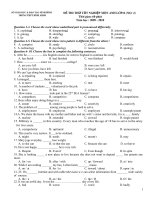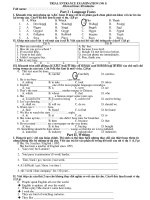TRIAL TEST 14
Bạn đang xem bản rút gọn của tài liệu. Xem và tải ngay bản đầy đủ của tài liệu tại đây (88.48 KB, 5 trang )
<span class='text_page_counter'>(1)</span><div class='page_container' data-page=1>
<b>THANH HOA high school</b> <b>THE TRIAL TEST FOR THE GCSE EXAM </b>
<b>Class: 12</b> <b>Time: 60 minutes</b>
<b>Name:</b> <b>Date:</b>
<b>No 14 - 007</b>
<b>Choose the word whose underlined part is pronounced differently from the other words.</b>
<b>1: A. </b>advises <b>B. </b>raises <b>C. </b>devises <b>D. misses</b>
<b>2: A. </b>means <b>B. </b>clean <b>C. </b>beaten <b>D. threat</b>
<b>3: A. </b>believed <b>B. equipped</b> <b>C. </b>relieved <b>D. </b>received
<b>Choose the word that has stress pattern different from the others.</b>
<b>4: A. </b>suppose <b>B. </b>attract <b>C. </b>discuss <b>D. bother</b>
<b>5: A. </b>modern <b>B. device</b> <b>C. </b>future <b>D. </b>labour
<b>Choose the best answer (A, B, C, or D) to fill the blank.</b>
<b>6:</b> If you want … there before dark, you should start at once.
<b>A. </b>get <b>B. to get</b> <b>C. </b>got <b>D. </b>getting
<b>7:</b> The stories … Tom tells are usually very funny.
<b>A. </b>by which <b>B. </b>of which <b>C. that</b> <b>D. </b>in which
<b>8:</b> What ... at this time tomorrow?
<b>A. will you be doing</b> <b>B. </b>will you have done
<b>C. </b>will you have been doing <b>D. </b>will you do
<b>9:</b> A whistle is the ... for the football players to begin the match.
<b>A. </b>communication <b>B. </b>sound <b>C. signal</b> <b>D. </b>point
<b>10:</b> ... my homework, I went to bed.
<b>A. </b>After I had finished <b>B. </b>After finishing <b>C. </b>Finished <b>D. A & B are correct</b>
<b>11:</b> Unemployment ... by 5% since the beginning of the year.
<b>A. </b>was raised <b>B. </b>has raised <b>C. </b>rose <b>D. has risen</b>
<b>12:</b> David: “Have a cigarette.”
Philip: “... I am trying to stop.”
<b>A. No, thanks</b> <b>B. </b>Thank you <b>C. </b>Not at all <b>D. </b>Come on
<b>13:</b> If I had tried it again, I think that I … successful.
<b>A. </b>will be <b>B. would have been</b> <b>C. </b>am <b>D. </b>would be
<b>14:</b> ... that they were a better team, they lost the match.
<b>A. </b>Even as <b>B. Despite the fact</b> <b>C. </b>However <b>D. </b>In spite of
<b>15:</b> She got up late and ... to the bus stop.
<b>A. went quickly</b> <b>B. </b>dropped by <b>C. </b>went leisurely <b>D. </b>came into
<b>16:</b> This is a photograph of our friends with … we went on holiday.
<b>A. </b>they <b>B. whom</b> <b>C. </b>them <b>D. </b>who
<b>17:</b> Paul: “I am having an examination tomorrow.”
Peter: “…”
<b>A. </b>Be careful <b>B. </b>Why? <b>C. </b>Congratulations! <b>D. Goodluck!</b>
<b>18:</b> Jane came ... a beautiful picture when she was tidying the room.
<b>A. across</b> <b>B. </b>into <b>C. </b>round <b>D. </b>past
<b>19:</b> … he has a very important job, he is not well paid.
<b>A. </b>Even <b>B. </b>Because <b>C. Although</b> <b>D. </b>Since
<b>20:</b> When do children ... England start their compulsory education ... school?
<b>A. in /at</b> <b>B. </b>of / at <b>C. of / in</b> <b>D. </b>in / in
<b>21:</b> ... when Peter suddenly came to see me.
<b>A. </b>While having dinner <b>B. </b>I am having dinner <b>C. </b>When having dinner <b>D. I was having dinner</b>
<b>22:</b> Susan: What an attractive hair style you have got, Mary!
Mary: “ ……….. ”
<b>A. </b>Thank you very much. I am afraid <b>B. </b>You are telling a lie
<b>C. Thank you for your compliment</b> <b>D. </b>I don't like your saying
<b>23:</b> The aim of Doi Moi was ... the economy of Vietnam and to raise the living standards of the people.
<b>A. </b>restructuring <b>B. to restructure</b> <b>C. </b>restructured <b>D. </b>restructure
</div>
<span class='text_page_counter'>(2)</span><div class='page_container' data-page=2>
<b>A. difficulties</b> <b>B. </b>difficulty <b>C. </b>difficult <b>D. </b>difficultly
<b>25:</b> A man ... a lot of money in the box got on the bus.
<b>A. </b>carried <b>B. </b>carrying <b>C. </b>being carrying <b>D. to carry</b>
<b>26:</b> ... the dance, Jerry said good-bye to his girlfriend.
<b>A. </b>Before he leaves <b>B. </b>Before left <b>C. Before leaving</b> <b>D. </b>Before he will leave
<b>27:</b> Billy, come and ... with cooking.
<b>A. </b>will help <b>B. </b>helping <b>C. </b>prepared <b>D. help</b>
<b>28:</b> ... in the world export diamonds.
<b>A. </b>Only a little nations <b>B. </b>Only little nations <b>C. Only a few nations</b> <b>D. </b>Only few nations
<b>29:</b> Can students in the USA ... every level ... education choose their own subjects?
<b>A. </b>with /of <b>B. </b>of /of <b>C. at /of</b> <b>D. </b>in /of
<b>30:</b> We have just received ... S O S from that ship.
<b>A. an</b> <b>B. </b>the <b>C. </b>a <b>D.</b> θ
<b>Identify the one underlined (A, B, C or D) that must be corrected.</b>
<b>31:</b> My parents would never let me forget doing my homework.
<b>A B C D</b>
<b>32:</b> I love see films but I seldom find time to go the cinema.
<b>A B C D </b>
<b>33:</b> It would have been better if you wouldn’t have argued with him last night.
<b> A B C D</b>
<b>34: </b> They asked me how long did it take to get to Paris by train.
<b>A B C D</b>
<b>35: </b> They were discussing enthusiastically when their teacher comes in.
<b>A B C D</b>
<b>Choose the sentence which has the closest meaning to the original one.</b>
<b>36:</b> The man suddenly realized that the neighbor was watching him.
<b>A. The man suddenly realized that he was being watched by the neighbor.</b>
<b>B. </b>The neighbor was watching the man and he suddenly realized that.
<b>C. </b>The neighbor was suddenly realized the man and watching him.
<b>D. </b>The man suddenly realized that he was watched bythe neighbor.
<b>37:</b> They didn’t buy anything from the supper market.
<b>A. Nothing was bought from the supper market.</b>
<b>B. </b>They bought anything from the supper market.
<b>C. </b>Nothing wasn’t bought from the supper market.
<b>D. </b>They bought something from the supper market.
<b>38:</b> The last time I saw Helen in London was in 2006.
<b>A. </b>I had seen Helen in London in 2006.
<b>B. </b>I didn’t see Helen in London in 2006.
<b>C. I haven’t seen Helen in London since 2006.</b>
<b>D. </b>I have seen Helen in London after 2006.
<b>39:</b> “How beautiful is the dress you have just bought!” Peter said to Mary.
<b>A. </b>Peter said thanks to Mary for her beautiful dress.
<b>B. </b>Peter asked Mary how she had just bought a beautiful dress.
<b>C. </b>Peter promised to buy Mary a beautiful dress.
<b>D. Peter complimented Mary on her beautiful dress.</b>
<b>40:</b> She did not thank us for our help when she left.
<b>A. </b>We thanked for her help and she left.
<b>B. </b>When she left, she helped us to say thank you.
<b>C. She left without thanking us for our help.</b>
<b>D. </b>She did not leave and thanked us for our help.
<b> Read the passage and choose the best answer (A, B, C or D) to fill the blanks.</b>
</div>
<span class='text_page_counter'>(3)</span><div class='page_container' data-page=3>
We have a separate checklist for each day of the week. Each list is slightly different. Each person will
have a number assigned to him for the day. He will complete all corresponding items (44)...
the checklist, starting at the top, and complete them in sequence. We will cheerfully work together on
each room (45)...the checklist for that room is done, then move on to the next room. Any
disputes over the completion of a chore will be settled by Mom or Dad.
<b>36. A.</b> needed <b>B.</b> contrary <b>C.</b> important <b>D.</b> close
<b>37. A.</b> Each <i><b> </b></i><b>B.</b> all <b>C. </b> Some <b>D. </b> No
<b>38. A.</b> made <b>B.</b> solved <b>C.</b> done <b>D.</b> left
<b>39. A.</b> from <i><b> </b></i><b>B.</b> by <b>C.</b> on <b>D.</b> in
<b>40. A.</b> until <i><b> </b></i><b>B.</b> as soon as <b>C.</b> after <b>D.</b> by the time
<b>Read the passage and choose the best answer (A, B, C or D).</b>
Every child in England is provided with full time of education from the age of five to sixteen. Many
parents send their children to state schools where the titution and equipment, textbooks and exercise
books are given free of charge. About 5% of children go to fee-paying schools. Under the old system,
children attended primary school (from five to eleven) which was followed by a secondary school course
(from eleven to sixteen or over). At eleven every child had to sit for the eleven-plus examination. <b>It</b>
consisted of tests in English, Arithmetic and intelligence tests. <b>Those</b> with the highest marks (about
20% of the children) were allowed to go to gifted school. The others were sent to technical schools.
<b>46:</b> How many percentages of children were sent to technical schools?
<b>A. </b>Only 80% <b>B. </b>Under 80% <b>C. </b>Over 80% <b>D. About 80%</b>
<b>47:</b> Didn’t children at eleven have to sit for the eleven-plus examination?
<b>A. Yes, they did</b> <b>B. </b>No, they didn’t <b>C. </b>Yes, they didn’t <b>D. </b>No, they did
<b>48:</b> What does the word <b>It</b> mean? <b>It</b> means ... .
<b>A. the eleven-plus examination</b> <b>B. </b>secondary schools
<b>C. </b>primary schools <b>D. </b>tests in English
<b>49:</b> What does the word <b>Those</b> mean?
<b>A. </b>Every child <b>B. Children</b> <b>C. </b>the others <b>D. </b>A & C are correct
<b>50:</b> Who were sent to state schools?
<b>A. </b>many parents <b>B. </b>5% of children <b>C. </b>parents <b>D. Their children</b>
</div>
<span class='text_page_counter'>(4)</span><div class='page_container' data-page=4>
<b>I.Choose the word whose underlined part is pronounced differently from the other words.</b>
<b>Câu 1: A. </b>advises <b>B. </b>raises <b>C. </b>devises <b>D. misses</b>
<b>Câu 2: A. </b>means <b>B. </b>clean <b>C. </b>beaten <b>D. threat</b>
<b>Câu 3: A. </b>believed <b>B. equipped</b> <b>C. </b>relieved <b>D. </b>received
<b>II. Choose the word that has stress pattern different from the others.</b>
<b>Câu 4: A. </b>suppose <b>B. </b>attract <b>C. </b>discuss <b>D. bother</b>
<b>Câu 5: A. </b>modern <b>B. device</b> <b>C. </b>future <b>D. </b>labour
<b>III. Choose the best answer (A, B, C, or D) to fill the blank.</b>
<b>Câu 6:</b> If you want … there before dark, you should start at once.
<b>A. </b>get <b>B. to get</b> <b>C. </b>got <b>D. </b>getting
<b>Câu 7:</b> The stories … Tom tells are usually very funny.
<b>A. </b>by which <b>B. </b>of which <b>C. that</b> <b>D. </b>in which
<b>Câu 8:</b> What ... at this time tomorrow?
<b>A. will you be doing</b> <b>B. </b>will you have done <b>C. </b>will you have been doing <b>D. </b>will you do
<b>Câu 9:</b> A whistle is the ... for the football players to begin the match.
<b>A. </b>communication <b>B. </b>sound <b>C. signal</b> <b>D. </b>point
<b>Câu 10:</b> ... my homework, I went to bed.
<b>A. </b>After I had finished <b>B. </b>After finishing <b>C. </b>Finished <b>D. A & B are correct</b>
<b>Câu 11:</b> Unemployment ... by 5% since the beginning of the year.
<b>A. </b>was raised <b>B. </b>has raised <b>C. </b>rose <b>D. has risen</b>
<b>Câu 12:</b> P1: “Have a cigarette.” – P2: “...” . “I am trying to stop.”
<b>A. No, thanks</b> <b>B. </b>Thank you <b>C. </b>Not at all <b>D. </b>Come on
<b>Câu 13:</b> If I had tried it again, I think that I … successful.
<b>A. </b>will be <b>B. would have been</b> <b>C. </b>am <b>D. </b>would be
<b>Câu 14:</b> ... that they were a better team, they lost the match.
<b>A. </b>Even as <b>B. Despite the fact</b> <b>C. </b>However <b>D. </b>In spite of
<b>Câu 15:</b> She got up late and ... to the bus stop.
<b>A. went quickly</b> <b>B. </b>dropped by <b>C. </b>went leisurely <b>D. </b>came into
<b>Câu 16:</b> This is a photograph of our friends with … we went on holiday.
<b>A. </b>they <b>B. whom</b> <b>C. </b>them <b>D. </b>who
<b>Câu 17:</b> P1: “I am having an examination tomorrow.” – P2: “…”
<b>A. </b>Be careful <b>B. </b>Why? <b>C. </b>Congratulations! <b>D. Goodluck!</b>
<b>Câu 18:</b> Jane came ... a beautiful picture when she was tidying the room.
<b>A. across</b> <b>B. </b>into <b>C. </b>round <b>D. </b>past
<b>Câu 19:</b> … he has a very important job, he is not well paid.
<b>A. </b>Even <b>B. </b>Because <b>C. Although</b> <b>D. </b>Since
<b>Câu 20:</b> When do children ... England start their compulsory education ... school?
<b>A. in /at</b> <b>B. </b>of / at <b>C. of / in</b> <b>D. </b>in / in
<b>Câu 21:</b> ... when Peter suddenly came to see me.
<b>A. </b>While having dinner <b>B. </b>I am having dinner <b>C. </b>When having dinner <b>D. I was having dinner</b>
<b>Câu 22:</b> P1: What an attractive hair style you have got, Mary! – P2: “ ... ”
<b>A. </b>Thank you very much. I am afraid <b>B. </b>You are telling a lie
<b>C. Thank you for your compliment</b> <b>D. </b>I don't like your saying
<b>Câu 23:</b> The aim of Doi Moi was ... the economy of Vietnam and to raise the living standards of the people.
<b>A. </b>restructuring <b>B. to restructure</b> <b>C. </b>restructured <b>D. </b>restructure
<b>Câu 24:</b> Before Doi Moi our country experienced a lot of ... .
<b>A. difficulties</b> <b>B. </b>difficulty <b>C. </b>difficult <b>D. </b>difficultly
<b>Câu 25:</b> A man ... a lot of money in the box got on the bus.
<b>A. </b>carried <b>B. </b>carrying <b>C. </b>who was carrying <b>D. B & C are correct</b>
<b>Câu 26:</b> ... the dance, Jerry said good-bye to his girlfriend.
<b>A. </b>Before he leaves <b>B. </b>Before left <b>C. Before leaving</b> <b>D. </b>Before he will leave
<b>Câu 27:</b> Billy, come and ... with cooking.
<b>A. </b>will help <b>B. </b>helping <b>C. </b>prepared <b>D. help</b>
<b>Câu 28:</b> ... in the world export diamonds.
<b>A. </b>Only a little nations <b>B. </b>Only little nations <b>C. Only a few nations</b> <b>D. </b>Only few nations
<b>Câu 29:</b> Can students in the USA ... every level ... education choose their own subjets?
<b>A. </b>with /of <b>B. </b>of /of <b>C. at /of</b> <b>D. </b>in /of
<b>Câu 30:</b> We have just received ... S O S from that ship.
</div>
<span class='text_page_counter'>(5)</span><div class='page_container' data-page=5>
<b>IV. Identify the one underlined (A, B, C or D) that must be corrected.</b>
<b>Câu 31:</b> They would never (A) let me (B) forget (C) doing (D) my homework.
<b>Câu 32:</b> I love see (A) films but (B) I seldom (C) find time to go (D) the cinema.
<b>Câu 33:</b> It would have (A) been better (B) if you wouldn’t have (C) argued with him (D) last night.
<b>Câu 34: </b> They asked me how long (A) did it take (B) to get to (C) Paris by train (D).
<b>Câu 35: </b> They were discussing (A) enthusiastically (B) when their (C) teacher comes (D) in.
<b>V. Choose the sentence which has the closest meaning to the original one.</b>
<b>Câu 36:</b> The man suddenly realized that the neighbor was watching him.
<b>A. The man suddenly realized that he was being watched by the neighbor.</b>
<b>B. </b>The neighbor was watching the man and he suddenly realized that.
<b>C. </b>The neighbor was suddenly realized the man and watching him.
<b>D. </b>The man suddenly realized that he was watched bythe neighbor.
<b>Câu 37:</b> They didn’t buy anything from the supper market.
<b>A. Nothing was bought from the supper market.</b> <b>B. </b>They bought anything from the supper market.
<b>C. </b>Nothing wasn’t bought from the supper market. <b>D. </b>They bought something from the supper market.
<b>Câu 38:</b> The last time I saw Helen in London was in 2006.
<b>A. </b>I had seen Helen in London in 2006. <b>B. </b>I didn’t see Helen in London in 2006.
<b>C. I haven’t seen Helen in Lodon since 2006.</b> <b>D. </b>I have seen Helen in London after 2006.
<b>Câu 39:</b> “How beautiful is the dress you have just bought!” Peter said to Mary.
<b>A. </b>Peter said thanks to Mary for her beautiful dress.<b>B. </b>Peter asked Mary how she had just bought a
beautiful dress.
<b>C. </b>Peter promised to buy Mary a beautiful dress. <b>D. Peter complimented Mary on her beautiful dress.</b>
<b>Câu 40:</b> She did not thank us for our help when she left<i><b>.</b></i>
<b>A. </b>We thanked for her help and she left. <b>B. </b>When she left, she helped us to say thank you .
<b>C. She left without thanking us for our help.</b> <b>D. </b>She did not leave and thanked us for our help.
<b>VI. Read the passage and choose the best answer (A, B, C or D) to fill the blanks.</b>
In America, the simple words “I’m sorry” display very good manners in many difficult ...(41)... situations.
“I’m sorry” has two main uses: to express your sympathy to someone who has a bad experience and to
express your ...(42)... when you have bothered someone or ...(43)... a problem. Other useful apologies are
“excuse me!” and “pardon me”, which mean the same thing. These ...(44)... are appropriate when pushing
your way out of a crowded elevator or stopping a stranger to ask ...(45)... .
<b>Câu 41: A. </b>socialist <b>B. </b>socialism <b>C. social</b> <b>D. </b>society
<b>Câu 42: A. </b>love <b>B. regret</b> <b>C. </b>regtable <b>D. </b>hope
<b>Câu 43: A. </b>give <b>B. </b>offer <b>C. </b>demand <b>D. caused</b>
<b>Câu 44: A. </b>speeches <b>B. verbals</b> <b>C. </b>expressions <b>D. </b>talks
<b>Câu 45: A. </b>directed <b>B. </b>direct <b>C. directly</b> <b>D. </b>directions
<b>VII. Read the passage and choose the best answer (A, B, C or D).</b>
Every child in England is provided with full time of education from the age of five to sixteen. Many parents
send their children to state schools where the titution and equipment, textbooks and exercse books are given
free of charge. About 5% of children go to fee-paying schools. Under the old system, children attended
primary school (from five to eleven) which was followed by a secondary school course (from eleven to sixteen
or over). At eleven every child had to sit for the eleven-plus examination. <b>It</b> consisted of tests in English,
Arithmetic and intelligence tests. <b>Those</b> with the highest marks (about 20% of the children) were allowed to
go to gifted school. The others were sent to technical schools.
<b>Câu 46:</b> How many percentages of children were sent to technical schools?
<b>A. </b>Only 80% <b>B. </b>Under 80% <b>C. </b>Over 80% <b>D. About 80%</b>
<b>Câu 47:</b> Didn’t children at eleven have to sit for the eleven-plus examination?
<b>A. Yes, they did</b> <b>B. </b>No, they didn’t <b>C. </b>Yes, they didn’t <b>D. </b>No, they did
<b>Câu 48:</b> What does the word <b>It</b> mean? <b>It</b> means ... .
<b>A. the eleven-plus examinationB. </b>secondary schools<b>C. </b>primary schools <b>D. </b>tests in English
<b>Câu 49:</b> What does the word <b>Those</b> mean?
<b>A. </b>Every child <b>B. Children</b> <b>C. </b>the others <b>D. </b>A & C are correct
<b>Câu 50:</b> Who were sent to state schools?
</div>
<!--links-->
